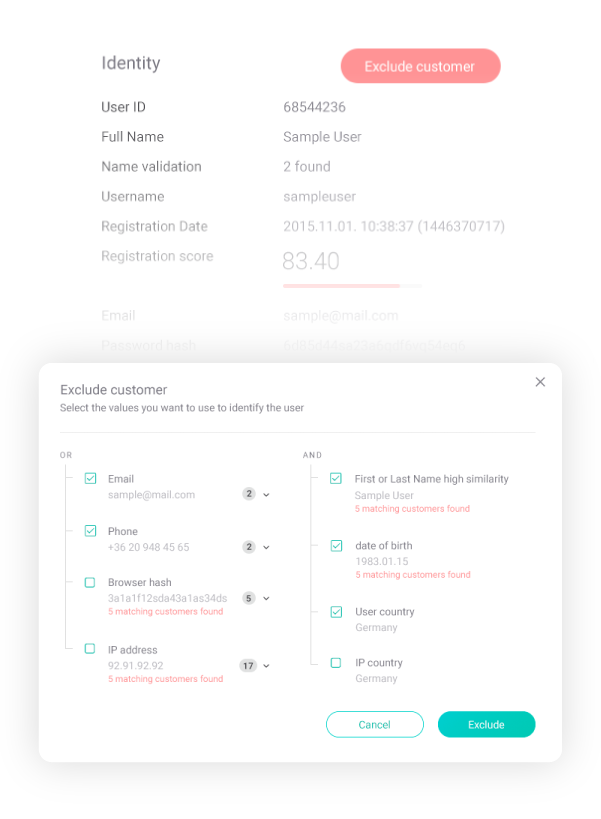Self exclusion and responsive playing are big topics in the gambling industry these days. Let’s see how AI can help protect those players most at risk.
While there is no shortage of research on problematic gambling, the digital landscape has opened the door to new fears about addictive behaviors. To remedy the problem, online gambling operators, casinos and platforms should promote safe gambling by:
- Protecting vulnerable gamblers
- Preventing underage gambling
- Creating a secure online environment
- Marketing ethically and responsibly
Most of the points above can be covered by the appropriate self-exclusion program.
What Are Self Exclusion Programs?
Self-exclusion programs are a legal requirement in a growing number of jurisdictions. Their goal is indeed to provide options for those with potential addiction issues, in order to to avoid further problematic gambling.
The key point is in the word “self”. While online gambling platforms and operators must implement an option, it is users who have to commit to the programs. The responsibility is on the individual, and they risk bans or penalties if they fail to meet self-imposed requirements.
Do Self Exclusion Programs Work?
Worldwide assessments of these kinds of programs have found that participants report lower gambling spends, improved financial circumstances, and a decrease in gambling frequency and time.
Research overwhelmingly points to positive results. According to a Canadian study published in 2014, 95% of problem gamblers had positive experiences with a self excluding initiative. Participants indicated that they had self-excluded:
- as a preventive measure (63 %),
- because they’d lost too much money (52 %)
- To avoid spending too much time on the site (36 %).
Worldwide assessments of these kinds of programs have found that participants report lower gambling spends, improved financial circumstances, and a decrease in gambling frequency and time.
As to why the programs work, there are complex psychological factors at play. Primarily, researchers believe a public commitment to reduce gambling is a strong enough incentive, increasing potential embarrassment if they break their agreement.
Leveraging KYC, and Fraud Tools for Self-Exclusion Programs
As we predicted in our list of fraud trends for the year, customer authentication will become increasingly stringent for online businesses. PSD2 is already shaking things up, and online gambling operators aren’t excluded. And fraud prevention tools are already your best bet for meeting legal requirements pertaining to KYC and strong customer authentication.
The questions is therefore the following: why not employ the same tools to deliver self-exclusion programs?
The crossovers are numerous. First, fraud and KYC tools are generally implemented at core authentication points (login, registration, deposit, withdrawal). These are the ideal touchpoints to reach out to gamblers.
Then, your online gambling platform already has all the customer info needed to flag users as needed. Customer name similarity, date of birth, phone number etc… and the picture becomes even more precise when you can implement strong email address profiling, or device fingerprinting solutions.
The Final Step – Filtering Problem Gamblers
Now that you can confidently picture who your players are, it’s time to analyse behavior to recommend the self exclusion programs. Combining human intelligence and machine learning, your platform can track suspicious user behavior – so why not create filters to flag users whose gambling could be problematic?
For instance, our SEON self-exclusion feature uses the same powerful data analysis as for fraud prevention, but offers to flag users based on increasing daily or weekly deposits, and hours spent on games.
Moreover, we provide a clear button to instantly mark users wishing to be self-excluded. It adds specific data points to a flag list and matches new registrations to the database, leveraging machine learning to tag suspicious / at-risk players.

Conclusion
Online gambling operators will be under increasing scrutiny from regulators to deliver a safe, positive experience for users. Self-exclusion programs appear to be a successful step in the right direction, but implementing them isn’t without increasing potential friction, costs, and complexity for the platform.
Luckily, it’s easy to meet two standards at once with the right fraud-protection solution. At SEON, we are proud to do our part to promote safe gambling. All while making it easier for your online gambling company’s fraud and legal team thanks to our out-of-the-box self-exclusion feature.
You might also be interested in reading about:








